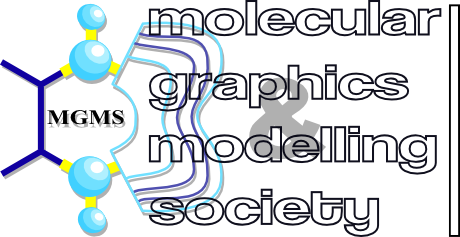Poster Session
Tuesday, February 18th, 13:30
|
| |
| P01 |
Sabahuddin Ahmad
(Düsseldorf, Germany) |
Understanding the substrate access mechanism in Phospholipase A from Pseudomonas aeruginosa |
Abstract |
| |
| P02 |
Amin Alibakhshi
(Kiel, Germany) |
Reproducing high accuracy QM interactions via empirical force fields |
Abstract |
| |
| P03 |
Felix Bänsch
(Recklinghausen/Jena, Germany) |
A new approach to DPD repulsion parameter estimation |
Abstract |
| |
| P04 |
Marcel Baltruschat
(Dortmund, Germany) |
Machine learning meets pKa |
Abstract |
| |
| P05 |
Filippo Balzaretti
(Bremen, Germany) |
Water contaminants on different models of rutile TiO2 - a DFT(B) / FF approach |
Abstract |
| |
| P06 |
Frank R. Beierlein
(Erlangen-Nürnberg, Germany) |
Probing DNA conformation: a multi-technique approach |
Abstract |
| |
| P07 |
Iga D. Biskupek
(Gdañsk, Poland) |
Studying conformational transitions of selected proteins using UNRES coarse-grained simulations with Lorentzian restraints |
Abstract |
| |
| P08 |
Manuel Deubler
(Erlangen-Nürnberg, Germany) |
Disarming the glycan shield of HIV: broadly neutralizing antibody PGT122 against HIV |
Abstract |
| |
| P09 |
Lukas Eberlein
(Dortmund, Germany) |
Nucleic acid building blocks: The role of tautomerism |
Abstract |
| |
| P10 |
Lennart Eisel
(Dortmund, Germany) |
A QM/SQM embedded cluster RISM approach for predicting EPR parameters of protein-bound nitroxide spin probes |
Abstract |
| |
| P11 |
Enrico Gandini
(Milan, Italy) |
Computational Studies of Antifreeze Peptides |
Abstract |
| |
| P12 |
Kevin Höllring
(Erlangen-Nürnberg, Germany) |
Influence of self-organization induced local clustering on self-diffusion of [CnMIm+] [NTf2-] in bulk and nanoconfined systems |
Abstract |
| |
| P13 |
Michael C. Hutter
(Saarbrücken, Germany) |
Druggability prediction using gene ontology terms |
Abstract |
| |
| P14 |
Julia B. Jasper
(Frankfurt, Germany) |
What can we learn from local water happiness? |
Abstract |
| |
| P15 |
Sascha Jung
(Dortmund, Germany)
(Erlangen, Germany) |
Protonation effects of endothiapepsin-fragment complexes |
Abstract |
| |
| P16 |
Jonas Kaindl
(Erlangen-Nürnberg, Germany) |
Metadynamics Simulations Reveal Binding of PAR2 to its Trypsin Activated N-terminus |
Abstract |
| |
| P17 |
Jan Kaiser
(Freiburg, Germany) |
Monte Carlo simulation and thermodynamic integration applied to protein charge transfer |
Abstract |
| |
| P18 |
Mattia Livraghi
(Erlangen-Nürnberg, Germany) |
Highly cross-linked epoxy networks under mechanical strain |
Abstract |
| |
| P19 |
Fidele Ntie-Kang
(Buea/Halle/Prague, Cameroon/Germany/Czech Republic) |
Discovery of histone deacetylase inhibitors and HIV-1 latencyreversing agents by large-scale virtual screening |
Abstract |
| |
| P20 |
Lalehan Oktay
(Istanbul, Turkey) |
Targeted in silico screening of small molecule databases against breast cancer |
Abstract |
| |
| P21 |
Simon Schäfer
(Erlangen-Nürnberg, Germany) |
Mind the gap - linking crystal structures and sequences without misrepresentation in antibody research |
Abstract |
| |
| P22 |
Jonas Schaub
(Jena, Germany) |
Rule-based in-silico fragmentation for the analysis of natural product chemical space |
Abstract |
| |
| P23 |
Maximilian F. Schmidt
(Erlangen-Nürnberg, Germany) |
Hybridization of β-adrenergic agonists and antagonists confers G protein bias |
Abstract |
| |
| P24 |
David C. Schröder
(Bielefeld, Germany) |
Structure Determination of Peptides and Peptidotriazoles by MD Simulations |
Abstract |
| |
| P25 |
Laura Schulz
(Frankfurt, Germany) |
Sampling of ligand-induced conformational changes in renin and factor VIIa |
Abstract |
| |
| P26 |
Slavica Subic
(Erlangen-Nürnberg, Germany) |
Prediction of odour (PrOdour) – data exploration |
Abstract |
| |
| P27 |
Navista S. O. Ujiantari
(Innbruck/Yogyakarta, Austria/Indonesia) |
Pharmacophore-based virtual screening to identify new β3-adrenergic receptor agonists |
Abstract |
| |
| P28 |
Emire Uyanık
(Ankara, Turkey) |
Design of thiophene and thiadiazoloquinoxaline containing semiconducting polymer |
Abstract |
| |
| P29 |
Vincent Stegmaier
(Berlin, Germany) |
Protonation dynamics in cytochrome c oxidase |
Abstract |
| |
| P30 |
Sören von Bülow
(Frankfurt, Germany) |
Dynamics of crowded macromolecules from atomistic simulations |
Abstract |
| |
| P31 |
Marius Wenz
(Berlin, Germany) |
In search of binding competent structures of the tWW domain using classical molecular dynamics simulations |
Abstract |
| |
| P32 |
Sandro Wrzalek
(Berlin, Germany) |
Identification of conformational states and transitions in between from molecular dynamics trajectories and vibrational signatures |
Abstract |
| |
| P33 |
Karolina Ziêba
(Gdañsk, Poland) |
Simulations of the membrane proteins in the lipid bilayer with the UNRES coarse-grained force field |
Abstract |


